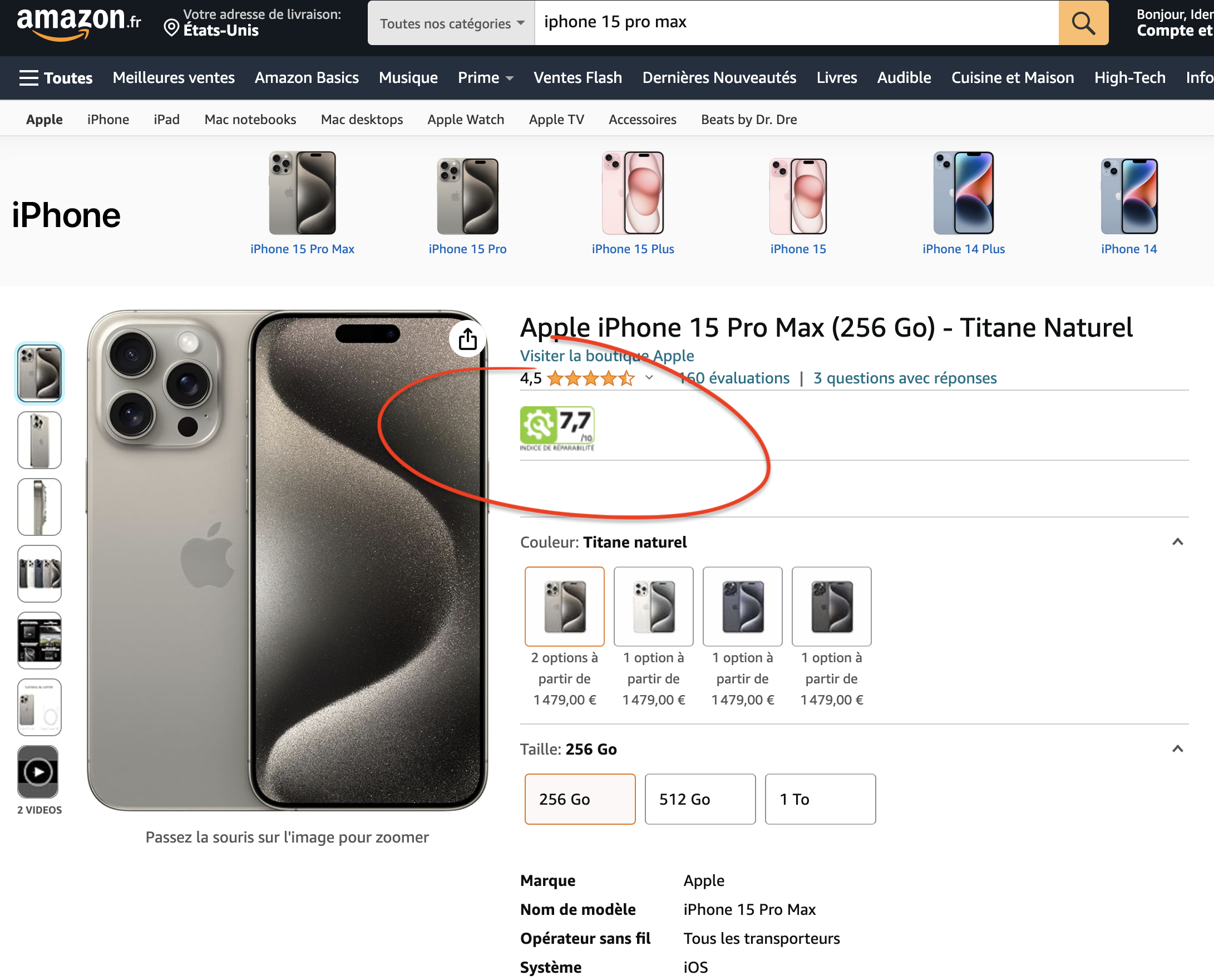
Tell Amazon: We need repair scores
Add your name.
Dear Federal Trade Commission Chair Lina Khan,
When consumers can fix instead of replace electronics, it saves money, cuts harmful electronic waste and provides economic opportunity for local businesses. As the FTC has demonstrated in your “Nixing the Fix” report, repair is often restricted by the business practices of manufacturers, and also by the design of some of the products we buy.
State lawmakers, often with help from FTC staff, have made progress on removing repair restrictions over the last few years. However, consumers still face a lack of transparent repairability information available to them before they make an expensive purchase, such as whether the product is glued together, or lacks basic service instructions.
Noting that the Commission voted unanimously in July of 2021 to “closely coordinate with state law enforcement and policymakers,” to combat repair restrictions, we are asking for the agency’s assistance in creating better transparency for potential customers seeking to understand the repairability of products at the point of sale.
Nobody walks into an electronics store and thinks, “I’m going to buy something that breaks.” But how do we know which products are designed to last?
As state lawmakers we are exploring reforms that provide our constituents with repair scores for products before they buy. In order to avoid duplication of efforts and maintain consistent repairability information across states, we are requesting federal support.
Repair scores for tech such as laptops, phones, and appliances, could work like EnergyGuide labels for repairability. They provide consumers with a 1 through 10 score that measures availability of spare parts, ease of disassembly, and longevity of support, before consumers purchase expensive devices.
We are asking the Federal Trade Commission to manage a voluntary criteria that would allow retailers and manufacturers to share with consumers how their products are designed to last. To ensure a consistent scoring criteria across the country, we need a federal standard. A national voluntary repair score criteria would allow us to efficiently bring these scores to our states. Similar to existing scoring policies, manufacturers could use a self-scoring rubric to allow efficient management of the criteria.
A study cited in the Commission’s Nixing the Fix report states, “the lack of information concerning durable and repairable products causes an asymmetry in the market balance and leaves consumers unable to make the best buying decisions regarding to their own needs.”1 Repair scores correct this asymmetry.
Samsung’s research on a similar program abroad found that 86% of surveyed French consumers say that the repair scoring impacts their purchasing behavior—including 8 out of 10 who indicated they would give up their favorite brand for a more repairable product.2 U.S. PIRG Education Fund’s Failing the Fix found these scores have also encouraged manufacturers to improve their designs with repairability in mind.3
Scoring policies in other countries mean manufacturers already have these scores. With the Commission’s support, all Americans will have access to repair scores as well.
Sincerely,
Alabama Senator Andrew Jones
Alaska Representative Zack Fields
Alaska Senator Scott Kawasaki
Colorado Representative Brianna Titone
Colorado Senator Janice Marchman
Colorado Representative Kyle Brown
California Assemblymember Luz M. Rivas
California Senator Dave Min
Delaware Representative Ruth Briggs King
Georgia Representative Marvin Lim
Georgia Representative Lydia Glaize
Hawaii Representative Gene Ward
Illinois Representative Michelle Mussman
Iowa Representative J.D. Scholten
Kentucky Representative Sarah Stalker
Maine Representative Lynne A. Williams
Maine Representative Victoria W. Doudera
Maine Representative Allison Hepler
Maine Representative Cheryl A. Golek
Maine Representative Lydia V. Crafts
Michigan Representative Erin Byrnes
Michigan Representative Natalie Price
Minnesota Representative Peter Fischer
Minnesota Representative Tina Liebling
Minnesota Senator John Marty
Nebraska Senator Tom Brandt
Nevada Assemblyman Howard Watts
Nevada Assemblywoman Tracy Brown-May
Nevada Assemblywoman Erica Mosca
New Hampshire Representative Matthew Coulon
New Hampshire Representative Eric B. Gallager
New Hampshire Representative Jason Gerhard
New Hampshire Representative Linda J Haskins
New Hampshire Representative Hope Damon
New Hampshire Representative John R. Cloutier
New Jersey Senator Shirley K. Turner
New Jersey Assemblywoman Sadaf F. Jaffer
New Mexico Representative Marian Matthews
New Mexico Representative Pamelya Herndon
New York Assemblywoman Donna A. Lupardo
New York Assemblyman Scott Bendett
New York Assemblymember Robert C. Carroll
New York Assemblywoman Aileen M. Gunther
New York Assemblymember Linda B. Rosenthal
New York Assemblymember Jo Anne Simon
North Carolina Representative Pricey Harrison
North Carolina Representative Julie von Haefen
North Dakota Senator Tim Mathern
Oklahoma Representative Jim Olsen
Oregon Senator Deb Patterson
Utah Senator Nate Blouin
Vermont Senator Andrew Perchlik
Vermont Senator Robert Norris
Vermont Representative Jessica C. Brumsted
Virginia Delegate Michelle Lopes Maldonado
Washington Representative Julia Reed
Washington Representative Beth Doglio
Washington Senator Yasmin Trudeau
Wisconsin Senator Kelda Roys
We need Amazon to display a repair score from 0 to 10, which tells us how fixable a product is.
Add your name.
Lucas leads PIRG’s Designed to Last campaign, fighting against obsolescence and e-waste and winning concrete policy changes that extend electronic consumer product lifespans and hold manufacturers accountable for forcing upgrades or disposal.
Report ●
